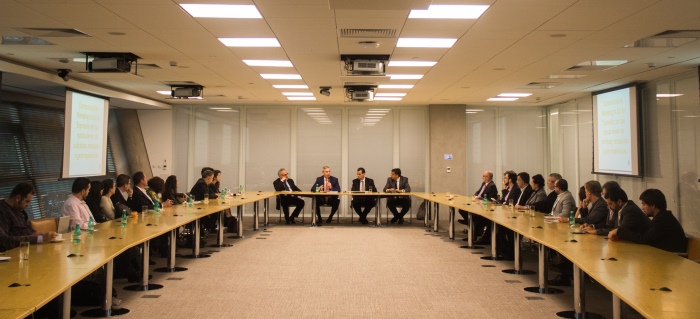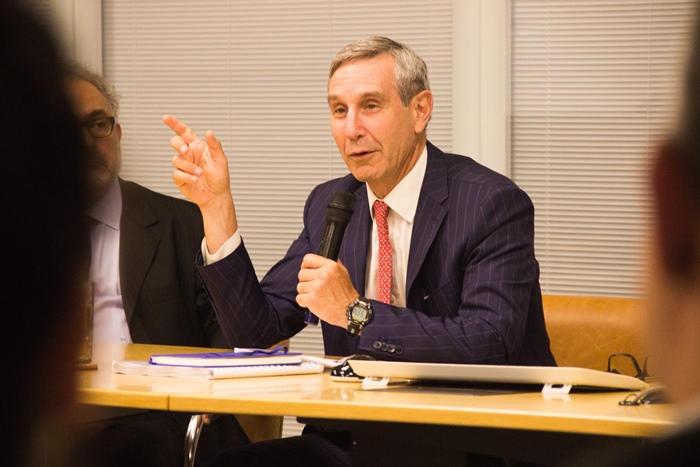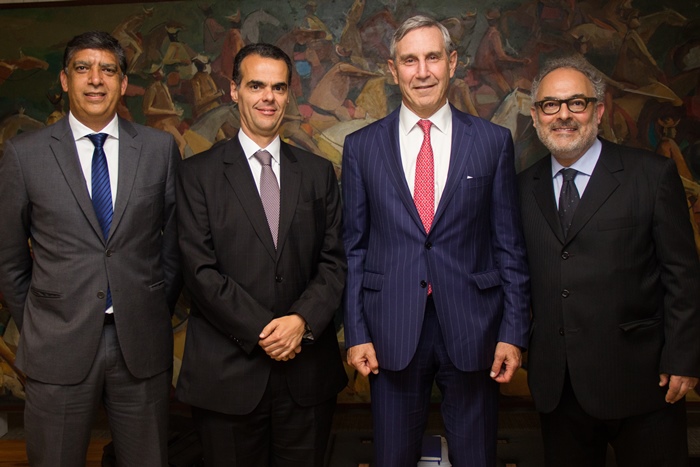Richard Edelman: “Create Your Own Media”

Paulo Noviello

The third edition of Lidercom CEOs – brought together senior communications executives from leading companies in Brazil, such as Vale, Natura, Votorantim and Itaú, to discuss the major challenges of the market and how to bring them to the attention of their CEOs. On August 4 Richard Edelman, one of the most renowned names in Corporate Communications, spoke at the conference. Mr. Edelman is the president and CEO of Edelman, a leading global communications marketing firm founded in 1952. Richard has a Bachelor of Arts degree from Harvard College and an MBA from Harvard Business School. Since 1996 he has been responsible for the legacy of the firm started by his father. Edelman topped PRWeek’s list of most powerful executives (2013).
Edelman began his speech, held at Itaú BBA in Sao Paulo, with a compelling declaration: “There has never been a more challenging moment for communications in Brazil.” But he added, for him, this situation is not new. In fact, he believes it is very similar to the economic crisis that followed the bankruptcy of Lehman Brothers in 2008, in the United States.

“The financial crisis there was worse than here, some CEOs were dismissed, 17% of families lost their homes. CEOs went into the bunker, refused to speak, yet their actions eliminated jobs and wages fell,” he said. “Eight years later, we have this scenario in the US presidential elections, with Donald Trump. I could not have imagined even in my worst nightmares, with that hair.” Edelman drew a laugh from the audience. He explained that the rise of populism, regardless of ideology, reflects the lack of public confidence in institutions, starting with the government, but to a lesser extent, in corporations and the media as well.
He believes that it is the responsibility of corporations to lead the transformations and changes that can improve the lives of people, and, at the same time, preserve the economy and natural resources. He noted that communications has become even more strategic in today’s environment. “Media has changed forever and this revolution is rapidly approaching.” People rely more on social media than on traditional media, even though social media often prioritizes speed and viral content more than the truth.” For Edelman, companies must create their own media, hiring journalists and mounting internal newsrooms who work vertically, from the CEO to the lowest level of the organization.
“You have to start at the highest level, convincing the CEO that his company should not only make money, but it must also bring benefits to society in other ways. 80% of consumers want it. But this change will not come from the financial or legal departments, it must come from you. Communication is the engine of change,” he said. He pointed out that traditional companies can be disrupted, even within a years time, by transformations in the industry. This was evident in the taxi sector with the sudden emergence of Uber. “Everything you do must be carried out with the highest level of ethics. All companies – all- are under scrutiny because of the recent cases of corruption. The perception is that all of you are guilty, so you must be transparent,” he said
Edelman also made the point that to be a good employer you must treat your employees well and consider them as partners. “I had 90 people from Edelman who quit smoking. I told them ‘I’ll give you $2,000 right now if you promise to stop smoking.’ Trust in them, and they will keep their word,” he said.
Edelman also said that it is not enough for companies to have the best communications strategy if they don’t do well in their core business. This means having world-class professionals, including foreign ones, as well as good governance, transparency and management of the entire supply chain. He believes that Brazilian companies have this capability. “Of all the developing countries, the so-called BRICs, we can no longer rely on Russia, India or China, all of whom have problems that Brazil does not. You have the best brands and companies.”
He finished by reaffirming that companies need to be a force for good in society, and that communicators must have the courage to instill this message in CEOs.
For Paulo Marinho, Head of Corporate Communication at Itaú and president of the Board at Aberje, Edelman enunciated a series of important insights about the management of reputation. “Relationships with employees, must be utmost in the minds of CEOs, understanding that everything starts from the inside and moves outward, and that every company should be their own media. For me, these were the most important lessons,” he said. According to Marinho, Lidercom is the big “balcony” of Aberje: “Meetings like this provide a platform for the sharing and exchange of ideas and the mutual learning that is so important to all of us.”
Paulo Nassar, CEO of ABERJE said that Lidercom is “a group that brings together communication leaders interested in discussing the most important issues concerning legitimacy, reputation and corporate identity. The empowerment of the highest aspirations in communications within the framework of companies is one of the pillars of Aberje.”

COMENTÁRIOS:
Destaques
- Escola Aberje leva comunicadores para Amazônia em expedição imersiva
- Encontro de líderes debate responsabilidade do setor empresarial e papel da comunicação na COP30
- Aberje realiza reunião presencial com Comitês de Estudos Temáticos em São Paulo
- A comunicação é forte em mercados em que as associações são fortes
- Aberje participa do painel de entidades no 19º Congresso da Abraji
ARTIGOS E COLUNAS
Marcos Santos Maratona da vidaMônica Brissac Thought Leadership: marca pessoal x reputação corporativaLetícia Tavares Liderança comunicadora: um tema sempre atualHamilton dos Santos Comunicação é estratégica na economia contemporâneaCarlos Parente Um salto ornamental para mergulhar no pires



























